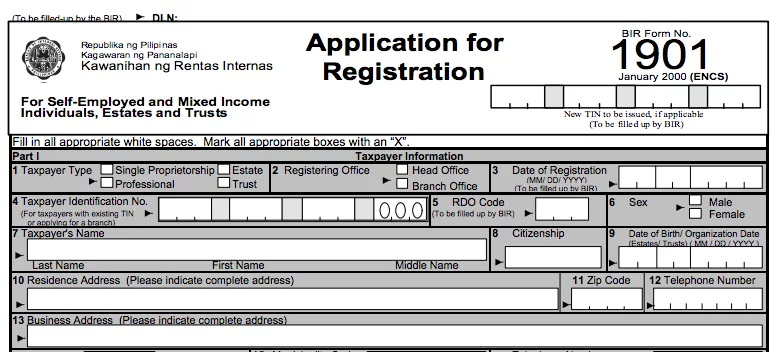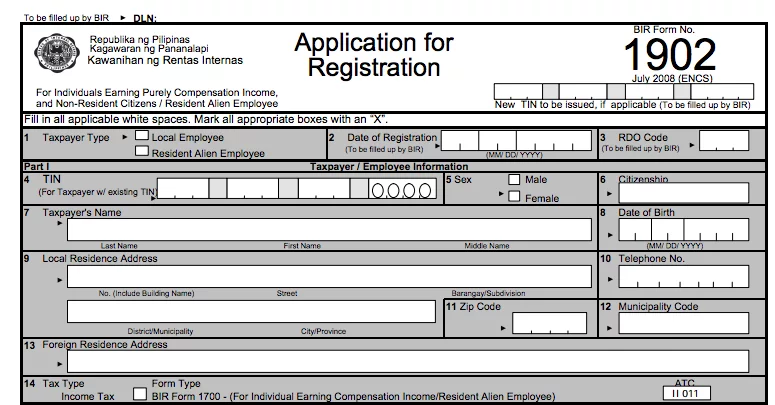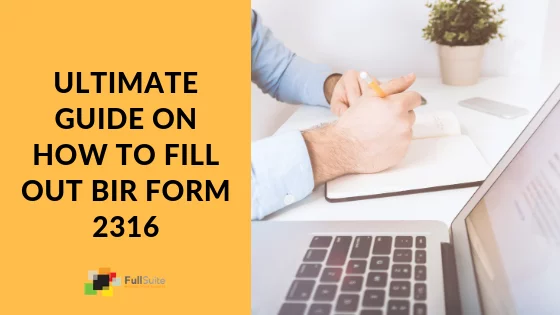There are different types of taxpayers you should be familiar with here in the Philippines. It oftentimes causes public confusion because these aren’t taught to everyone nor is there a resource for all these things.
And that’s why we’re here.
6 Common Types of Taxpayers
These definitions come from the BIR itself. You’ll find this as the ones in quotes. Then, I just added some explanations and examples after.
1) Self-employed
“Single Proprietors are persons engaged in trade or business not including performance of services as employee.”
The form to use when applying for this type of taxpayer is the BIR Form 1901.
This means if you are starting your own business as a Sole Proprietorship (registered with the DTI), this should be your taxpayer type.

You can apply for a new TIN online via BIR’s eTIN. Do not register online if you already have a TIN (e.g. you worked as an employee) then decided to open a business. Go to your RDO personally or have someone do it for you.
2) Professionals
“Professionals are self-employed individuals in the practice of profession or calling not including performance of services as employee. Examples of these are those engaged in computer, creative or performing arts, engineering, health, law, social science, teaching, personnel and human resource development, finance and sales, writing and journalism and others.”
Just like for self-employed, the form to use when applying for this type of taxpayer is the BIR Form 1901.
Freelancers fall under this category. Those with PRC licenses fall under this category. Consultants fall under this category.
You can apply for a new TIN online via BIR’s eTIN. Do not register online if you already have a TIN (e.g. you worked as an employee) then decided to open a business. Go to your RDO personally or have someone do it for you.
3) Mixed-Income
“Mixed Income Earners are persons who are any two of the following: Professionals, Single Proprietors, and Local Employees.
For instance, a teacher who is employed in a school, offers tutorial services for a fee, and operates a retail sales business on the side should register as a local employee, professional, and single proprietor all at the same time.”
As the name implies, it’s a type of taxpayer that means you’re registered to at least two other types. From our experience, this is usually the people who are still employed (corporate) but also have their own business (food stall).
You can apply for a new TIN online via BIR’s eTIN. Do not register online if you already have a TIN (e.g. you worked as an employee) then decided to open a business. Go to your RDO personally or have someone do it for you.
4) Employees (aka Purely Compensation Earner)
“Local Employees are citizens of the Philippines who work and derive income from an employer based within the Philippines.”
Majority of Filipinos fall under this. If you are a fresh graduate and you are completing your pre-employment requirements, this is your taxpayer type.
Those entering the workforce should keep this in mind. Y
The form to use for this type of registration is the BIR Form 1902.

As what we wrote last week, currently, there are only two ways to apply for a NEW TIN for employees: Offline by visiting your RDO; and Online via your employer’s account in eReg.
5) Under E.O. 98
“Persons Registering Under E.O. 98 are those individuals who are securing TIN to be able to transact with other government offices such as LTO, NBI, DFA, and others.”
This is the least common type. And for 99% of us, we don’t need to worry about this.
So there you have it. These are the 5 most common types of taxpayers in the Philippines. Of course, this list does not include legal entities like firms and other estates. This only covers the individual taxpayer types.







Hi. Can i use my TIN under E.O 98 as my TIN In case i want to be employed in future?
Hello Jane,
Yes, you are only assigned one TIN in your lifetime and it is illegal to secure an additional one.
You should provide your TIN to your future employer and they will be the one responsible in updating records.
Hi can i use my TIN number where i used it before to my employer and now i would like to start my own business as sole proprietor business?
Hello Tristan,
Yes, your existing TIN will be used for your sole proprietorship.
hello po tanong ko lang po nag paverify po aq knina ng TIN number ko sa RDO..ako po ay isang hamak na empleyado lamang pero lumabas po duon na may business aq at madaming cases po..paanu po kaya gagawin ko para maclear po? salamat po
Hello Christina,
We’d recommend having it verified again. Make sure to double check your full name, date of birth, and address on record.
Are you sure you never registered a business or had someone use your name and TIN in the registration?
You can also try to find out which RDO the business was registered in and prove that you never went there for any transaction and that someone else mistakenly used your details.
Good luck!